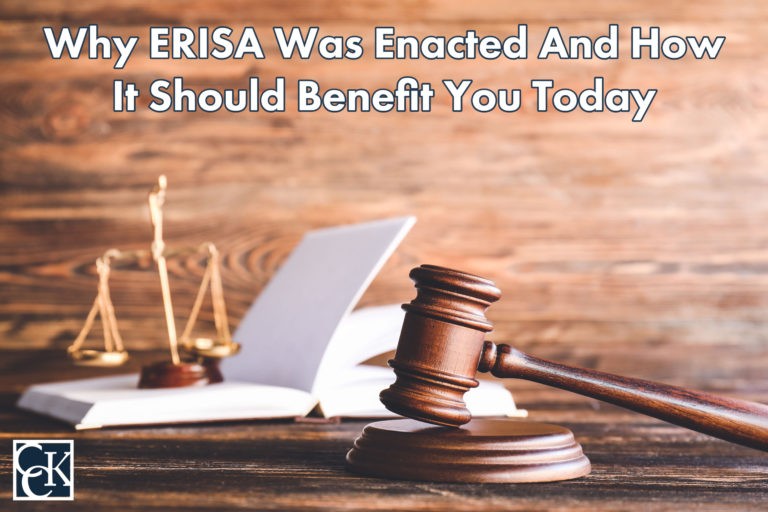Why ERISA Was Enacted And How It Should Benefit You Today

ERISA, or the “Employee Retirement Income Security Act of 1974,” is a federal law. The U.S. House of Representatives enacted ERISA to implement rules and standards plan administrators must follow to protect individuals who have employer-provided benefit plans.
These plans include pensions, retirement funds, welfare benefits, health benefits, and 401(k)s. It also covers most employer-provided long-term disability (LTD) and insurance policies, also called “group policies.” The original purpose of ERISA was to protect employees from the abuse and mismanagement of their benefits by their employers.
However, not all long-term disability plans are subject to ERISA. For example, if you work for a government entity or church, then your group policy is not subject to this federal law. Further, if you decide to buy an LTD policy yourself directly from an insurance company (i.e., an individual policy), then state law governs your policy.
What Is ERISA and Why Was It Enacted?
In the decades leading to the enactment of ERISA in the mid-1970s, employee pension plans were often poorly managed or insufficiently funded by employers. An employee could work for a company for years, expecting a pension at the end of their employment, only to discover that their employer mismanaged or inadequately funded their pension plan. Consequently, this often left them with far less than they expected—sometimes they would receive nothing at all.

Some plans would have long vesting schedules. These schedules would require 10, 20, or 30 years of work without interruption.
In other words, if an employee was laid off — or had to go on temporary leave due to a disability—then they might lose their benefits. To avoid paying these pension benefits, employers would terminate employees shortly before they became fully vested.
In short, ERISA is a federal law that helps protect employees from this mismanagement and abuse of benefits they receive through their employers.
The Studebaker-Packard Corporation’s Poorly Funded Pension Plan
One large-scale example of a poorly managed pension plan comes from the Studebaker-Packard Corporation (Studebaker). Studebaker was an automobile manufacturer located in South Bend, Indiana. Once a profitable company, it fell on tough times in the 1950s. By 1963, the company could no longer remain open and closed its doors by December of that year.
When Studebaker closed its doors in 1963, its liabilities exceeded its assets by $15 million. In other words, it could not afford to pay its more than 4,000 employees the pension plans they were owed.
In short, only those over the age of 60 and eligible for retirement received their full pension. Others under the age of 60 received a lump-sum payment only worth about 15 percent of their original pension. Still, most employees—including all employees under the age of 40—received nothing at all.
In the decade that followed, politicians frequently cited the Studebaker incident as they tried to enact a law that would protect employees from such mismanagement. This incident is synonymous with the creation of ERISA, which would occur in 1974.
What Does ERISA Do?
Before ERISA, pension plans were regulated by the IRA alone. To provide more oversight of retirement plans, the administration of ERISA is handled by three entities: the IRS, the U.S. Department of Labor, and the Pension Benefit Guaranty Corporation.

Under ERISA, your employer or plan administrator is legally required to supply you with plan-governing documents about your benefit plan. This includes accurate information regarding the features and benefits of your plan, as well as its funding sources.
Additionally, your plan administrator must adhere to strict fiduciary responsibilities, and your plan must establish a clear appeal process for claimants who are denied benefits. If your plan administrator does not supply you with information or fails to follow ERISA’s rules, then you have the right to sue for benefits in court.
ERISA vs. Non-ERISA Long-Term Disability Claims
It is pertinent to explain why a person may file a claim for long-term disability. In short, these benefits cover a percentage of your pre-disability earnings when you are unable to work due to a medical condition or illness for an extended period.

As mentioned, not all long-term disability policies are subject to ERISA. If you have a policy that is not subject to this strict federal law, then you must adhere to state law. Non-ERISA claims typically have fewer procedural obstacles.
If you have an LTD policy that must adhere to this federal law, then there are some key aspects of which you must be aware, namely:
- You must exhaust all appeals before filing a lawsuit in court
- You have 180 days to file your appeal if you receive a denial of your initial claim
- Insurance companies have 45 days to issue a decision on your claim but may take up to two additional 30-day extensions for various reasons
- The administrative appeal stage is often the last opportunity claimants have to submit new or updated evidence (i.e., you cannot submit new evidence during litigation)
- If you file a lawsuit, you may not sue for damages or bad faith practices
- If you file a lawsuit, a jury will not hear your case, only a judge
Of course, long-term disability claims may face numerous obstacles when filing or appealing for benefits. Nonetheless, ERISA often works in favor of insurance companies. It allows them to impose strict requirements on their benefit plans, which often leads to frequent benefit denials. If you are appealing a denial of long-term disability benefits, then you will have to appeal to the insurance company that denied you, which does not allow for third-party judgment.
Call CCK Today for a Free Case Evaluation
Obtaining long-term disability benefits can be difficult. The LTD claims and appeals process can be challenging, but it is not one you must handle on your own. Chisholm Chisholm & Kilpatrick has been helping long-term disability claimants for over 20 years obtain these all-important benefits and may be able to help you too.
Whether you are filing an initial claim, appealing a denial, or filing a lawsuit in court, our legal team has the necessary experience to assist you. We have extensive knowledge of ERISA and long-term disability insurance. Call CCK today at (800) 544-9144 for a free case evaluation with a member of our team. We will analyze your case and determine if we can help.
About the Author
Share this Post

